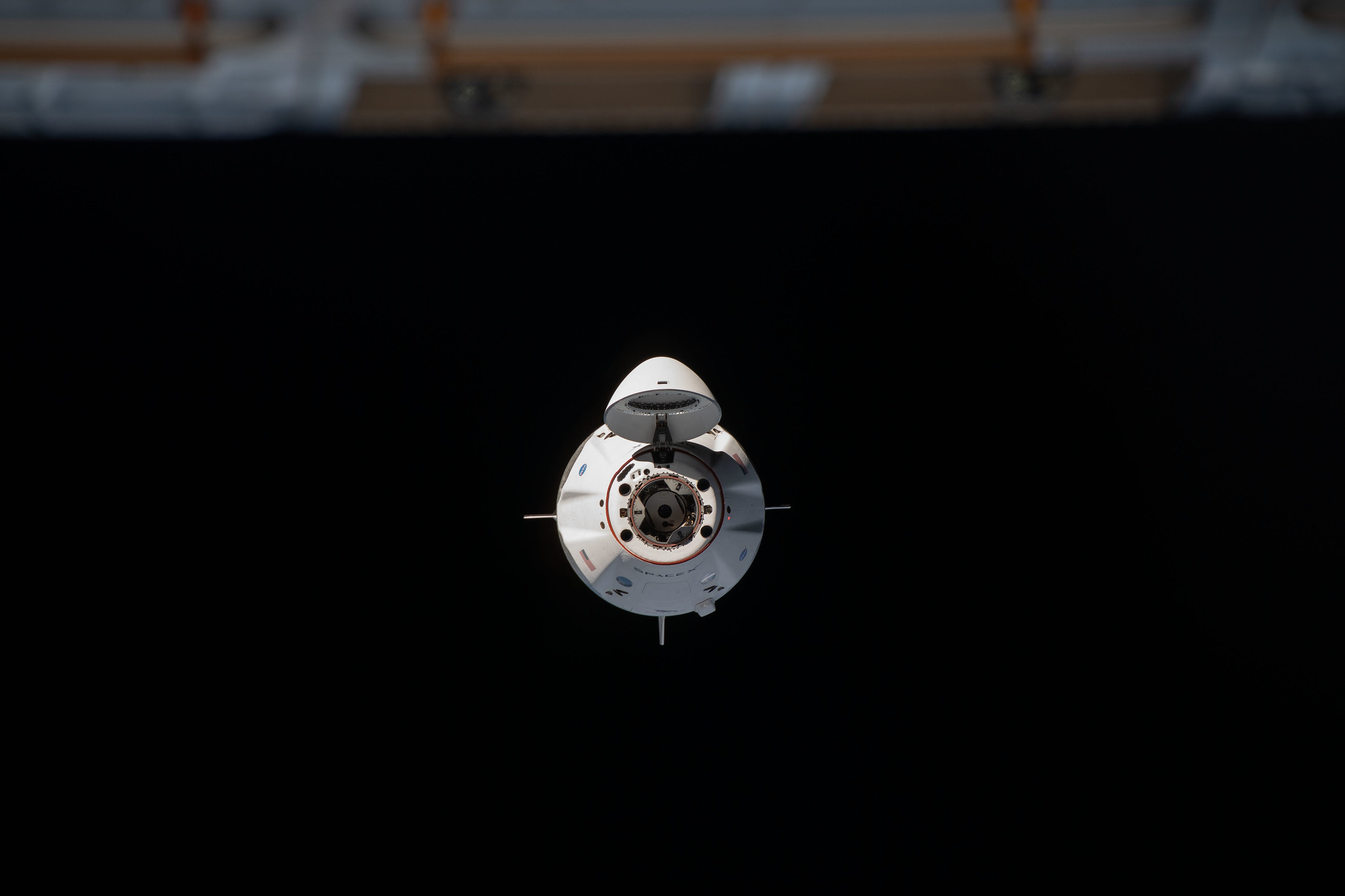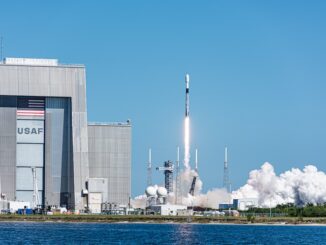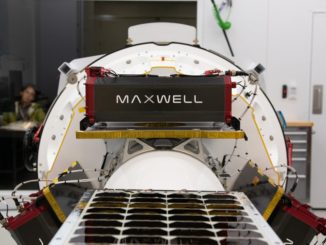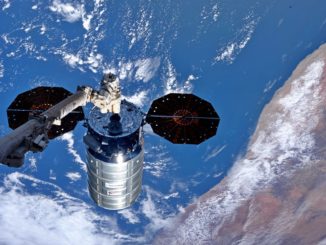
Commander Mike Hopkins and his three crewmates will board their Crew Dragon “Resilience” capsule Monday for a first-time maneuver to relocate the SpaceX-owned spaceship to a new docking port outside the International Space Station.
Hopkins and pilot Victor Glover will be flanked by Japanese astronaut Soichi Noguchi and NASA mission specialist Shannon Walker for the 45-minute maneuver to reposition the Crew Dragon spacecraft. They will be suited in their white SpaceX-made pressure garments, just like any other docking or undocking at the space station.
The docking port swap Monday will be the first time a SpaceX crew capsule has performed a relocation maneuver.
“We’re very excited about it,” Hopkins said Friday.
Russian Soyuz spacecraft have changed docking ports at the International Space Station 19 times, most recently on March 19.
“There is a big difference between how Soyuz does it and we do it,” Hopkins told Spaceflight Now in an interview last year. “Soyuz does it all manually, and this is planned to be automated. However, we do have a capability to take over and do it manually if we needed to.”
Hopkins’s crew launched Nov. 15 aboard the Crew Dragon spacecraft, which they named Resilience, from NASA’s Kennedy Space Center in Florida, kicking off the first fully operational flight of a SpaceX crew capsule. Their mission, known as Crew-1, docked with the International Space Station the next day.
The Crew Dragon Resilience glided in to a smooth docking with the forward port of the space station’s Harmony module, the same location once used by visiting space shuttles. The relocation maneuver Monday will park the Crew Dragon Resilience spacecraft at an identical docking port on the top, or zenith side, of the Harmony module.
Ground controllers at SpaceX headquarters in Hawthorne, California, planned to activate and check out systems on the Crew Dragon capsule Sunday.
“Sunday’s going to be really busy before we do the port relocate,” said Steve Stich, NASA’s commercial crew program manager. “We’ll wake Dragon up. It’s been largely quiescent for these four-and-a-half months (since docking).”
On the 141st day of their mission, Hopkins, Glover, Noguchi, and Walker will float into their spaceship early Monday and close hatches between the Crew Dragon and the space station.
The Crew Dragon Resilience spacecraft is scheduled to undock from the space station at 6:30 a.m. EDT (1030 GMT). A few minutes before the capsule detaches from the station, an automated command will begin the process of disconnecting power umbilicals and opening hooks to permit the Crew Dragon to depart the docking port.
“What’s interesting about it is it’s really a combination of really four different flight phases that we have with the vehicle. So there’s the standard undocking, which we will go through all the same steps — we’ll be suited — all of the same checks that we would on the normal day of undocking,” Hopkins said. “We just set a flag that tells the vehicle that this is going to be a relocate as opposed to a normal undocking.”
The capsule will back away to a distance of about 200 feet, or 60 meters, according to Stich, and use its Draco thrusters to fly from a position in front of the space station to a location above the complex.
“Then there’s a phase after that undocking where … the relative navigation systems have to reacquire, and so that’s a critical phase,” he said. “Once that is done, we’re then able to set up for that port relocation piece. And then once we command the port relocation piece to start, you go from that forward docking axis to the zenith docking axis. At that point, it’s like a normal docking all over again.”
The Crew Dragon’s computers will guide the capsule to an automated link-up with the zenith port on the Harmony module at 7:15 a.m. EDT (1115 GMT).
Just like Soyuz crews who head out for a relocation maneuver, the Dragon astronauts will be prepared to come back to Earth in case of problems reconnecting with the space station.
“In this very short period of time, we have three or four different phases of flight that are happening and still you have that potential that if something goes wrong on the docking attempt, you might end up coming home,” Hopkins said. “So we have to be prepared to come home as well.
“So it’s a very interesting piece of the flight, and we’re very excited that we get the opportunity to do that because I think it’ll be challenging, but I think it’ll be a great capability to add, particularly with the number of different types of vehicles that we have coming up in the near future,” Hopkins told Spaceflight Now.

NASA astronaut Kate Rubins, who was aboard the Soyuz MS-17 spacecraft when it swapped docking ports last month, said the relocation is “not just a pleasure trip.”
“It’s all of the fun and the work of undock day, plus all of the fun and the work of docking day,” Rubins said, speaking from recent experience. “It’s a lot of activity. But it’s pretty cool, and it is quite an amazing view to separate from your vehicle that’s been your home for months and to be able to look at it from 60 meters.”
The relocation Monday will clear the way for the next SpaceX crew mission to dock with the forward position on the Harmony module. SpaceX’s Crew-2 mission mission, set for launch April 22 from the Kennedy Space Center, will carry commander Shane Kimbrough, pilot Megan McArthur, Japanese astronaut Akihiko Hoshide, and European Space Agency astronaut Thomas Pesquet.
Hopkins and his crewmates are scheduled to end their mission April 28 with a departure from the space station and a fiery re-entry back into Earth’s atmosphere, culminating in a parachute-assisted splashdown off the coast of Florida.
Their undocking April 28 will then clear the top port on the Harmony module for the arrival of the next SpaceX Dragon cargo mission scheduled for launch June 3. NASA wants the Dragon cargo ship to dock with Harmony’s zenith port, within the reach of the space station’s Canadian-built robotic arm, which will extract a new pair of solar arrays from the Dragon’s trunk to upgrade the orbiting lab’s power system.
“We’ve got some pretty big milestones coming up, so let’s not take our foot of the gas and make sure we’re keeping our eye on the ball,” Hopkins said Friday.
Email the author.
Follow Stephen Clark on Twitter: @StephenClark1.



